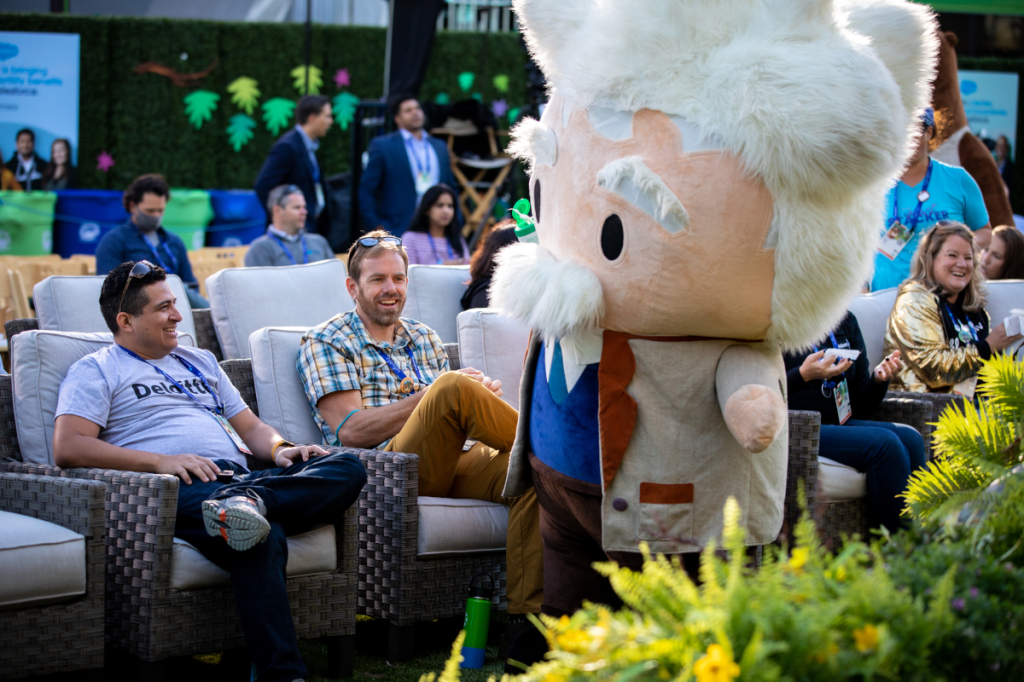When Sarah Aerni successfully trained an AI model to correctly label worm cells for her dissertation, she realized two things. First, that it’s really exciting when a model works precisely as it’s supposed to, and second, that an AI model should solve a clear problem. For example: no human should have to hand label 959 worm cells in microscopic images.
In a business context, it’s surprisingly not that different. How many menial or time-intensive tasks do employees get stuck doing where AI can help augment human intelligence and create efficiencies that weren’t possible before?
Aerni, now VP of AI & Machine Learning at Salesforce, joined the company in 2016 to address this and other very clear problems: deploying AI models that could deliver significant business benefits to customers and employees in a trusted and secure way.
Nearly seven years later, as generative AI captivates audiences with its wide-ranging abilities, Aerni and Salesforce are laser-focused on bringing trusted generative AI to the enterprise.
The company’s new AI Cloud platform, announced in June, will make it possible for every company to unleash the power of generative AI, making customer interactions more personalized and employees more productive with AI-powered assistance in their workflow.
Before Einstein: Enterprise AI innovation that paved the way
In 2014, Salesforce Chair, CEO, and Co-Founder Marc Benioff made a declaration at an internal company all-hands. “Salesforce will become an AI-first company.” The goal was to transform Salesforce into an ‘intelligent’ CRM, making it easy for every company and employee to harness the power of AI.
It was a natural evolution for Salesforce, which began as a system of record storing customer data. By adding technology to manage customer interactions across sales, service, marketing, and commerce, it became a system of engagement. And by using technologies like machine learning and natural language processing to deliver AI-powered predictions and insights, Salesforce would also become a system of intelligence.
Salesforce formed a development team to build AI across its product suite with the goal of democratizing AI. They asked themselves: Instead of every company needing data scientists to deploy AI, could Salesforce create an AI offering so simple that everyone could be their own data scientist?
Instead of every company needing data scientists to deploy AI, could Salesforce create an AI offering so simple that everyone could be their own data scientist?
At the same time, the corporate development team led by John Somorjai, now Salesforce’s Chief Corporate Development and Investments Officer, decided to keep an eye out for startups that could speed development by bringing additional AI expertise in-house.
To that end, in 2014, Salesforce acquired RelateIQ, which captured data from workplace communications — like email, calendar invites, phone calls, and social media posts, and then used machine learning to analyze that data and provide employees insights and reminders, such as a reminder for a sales rep to follow up with a lead. The technology was easy to implement and added automation capabilities to Salesforce’s low-end product suite.
A year later, in 2015, the team began work on a new AI project to solve a problem that sales teams had been facing for decades — how to prioritize which open sales opportunities to focus on.
The team built an opportunity scoring AI model that looked at variables such as the dollar value of the account, length of time the opportunity had been in play, and how many competitors were going after the same account to generate a rating. It could accurately forecast revenue by predicting what opportunities were most likely close and when — all with the click of a button. The Opportunity Scoring app was rolled out internally to Salesforce’s sales teams and became one of Salesforce’s first predictive AI capabilities.
This was the beginning of what became Salesforce Einstein.
Einstein: The next revelation
If you’ve attended a Salesforce event or visited the offices, odds are you’ve seen a Disney-like character version of Albert Einstein with white disheveled hair and mustache, dressed in a suit and tie. The real Einstein is a personal hero of Benioff’s, and he wanted to channel the spirit of Einstein into Salesforce’s AI platform. As a result, Salesforce Einstein became the name and face of Salesforce’s AI innovation.
Launched at Dreamforce in September 2016, Einstein helped further the mission of democratizing enterprise AI. In addition to powering tools like Opportunity Scoring, Einstein promised to make it easy for customers to quickly and easily use AI across sales, service, marketing, commerce and IT teams, deploying AI-powered apps to surface customer insights, predict future behavior, proactively recommend actions, and automate tasks. It would also automatically customize models for every single customer, and learn from every interaction and data point.
“Many enterprise companies were trying to deploy AI, but it was really hard. It felt like there was a world shortage of data scientists. Then, there was the challenge of bringing the data together to integrate it and model it. We wanted to make it easy,” said Parker Harris, Salesforce Co-Founder and Chief Technology Officer, at the launch of Einstein.
Many enterprise companies were trying to deploy AI, but it was really hard. It felt like there was a world shortage of data scientists. Then, there was the challenge of bringing the data together to integrate it and model it. We wanted to make it easy.”
Parker Harris, Salesforce Co-Founder and Chief Technology Officer
In the years that followed, Einstein continued to evolve and grow, becoming the leading AI for CRM, and one of the most ubiquitous enterprise AI platforms in the world. The company introduced out-of-the-box apps for lines of business like sales and service. For example, Einstein Conversation Insights helps uncover insights and trends from sales and service calls, analyzing large volumes of data and visualizing conversation trends like mentions of pricing discussions or competitors. Einstein Email Insights uses machine learning to provide sales reps with critical context alongside relevant emails to help sellers craft the perfect email.
Salesforce also deployed low-code tools for admins and developers to create their own custom prediction models without any coding. With Einstein Prediction Builder, users can create a model, for example, that predicts what products retailers should stock for the summer based on location data, customer data, and previous inventory data.
Now, Salesforce Einstein is generating more than one trillion predictions every week.
Leading with trust, guided by expert ethicists
Unlike consumer AI, like Apple’s Siri and Amazon Alexa, enterprise customers require higher levels of trust and security, especially in regulated industries.
With thousands of customers using Einstein’s AI capabilities, Salesforce must ensure that the AI models used are trusted, that customer data remains safe and secure, and that Einstein delivers accurate, unbiased results and adheres to compliance requirements for customers dealing with more sensitive data, as in the finance, healthcare, or government sectors. And once a new model is shipped, it has to be re-trained on their freshest data.
Salesforce has always operated with trust as its number one value. Today, Einstein has trust built into the fabric of the software, including guardrails intended to help guide customers to make ethically-informed choices. In addition, Salesforce tests models using diverse and representative data sets that are most appropriate for how the model is being used to mitigate bias.
“AI – especially Generative AI – has the power to transform the way we live and work in profound ways. But like any new technology, generative AI is not without risks and that’s where our office comes in,“ said Paula Goldman, EVP, Chief Ethical & Humane Use Officer. ”When you’re working with the world’s leading businesses — like Salesforce is — it’s critical that we explore this innovative technology in an intentional and responsible way so that ethics remain top of mind for our customers and our customers’ customers.”
AI – especially generative AI – has the power to transform the way we live and work in profound ways. But like any new technology, generative AI is not without risks and that’s where our office comes in”
Paula Goldman, EVP, Chief Ethical and HUmane Use Officer, Salesforce
Salesforce’s Office of Ethical and Humane Use, an internal team of AI ethicists, policy experts, UX researchers, and product professionals, has created a variety of tools to help employees and customers develop and use Salesforce technologies like AI responsibly, accurately, and ethically. For example, model cards communicate the performance characteristics of trained machine learning (ML) and AI models to help customers understand how models work — including inputs, outputs, the conditions under which models work best, and ethical considerations in their use.
From Salesforce’s own LLM to generative AI across every product
OpenAI’s launch of ChatGPT in November 2022 opened the world’s eyes to the newfound power of generative AI and with it, a new threshold of what AI could do. While Salesforce initially focused on predictive AI, the team had been exploring how to develop and deploy deep learning and generative AI for years.
“We’ve done a good job of marrying organic and inorganic innovation. We hire some of the world’s best software engineers and product leaders, and then we marry that with inorganic acquisitions to help us accelerate our efforts,” said Somorjai, who has now been leading Salesforce’s acquisitions team for 18 years.
Our goal is to empower people by making innovative AI tools that are also intuitive and simple to use.”
Silvio Savarese, chief scientist, salesforce
One of those key acquisitions was Metamind, an AI startup focused on deep learning, the use of neural networks in tasks processing large amounts of data. Metamind became the core of Salesforce’s AI in-house research team. Led by Richard Socher, a well-renowned computer scientist and former adjunct professor at Stanford, the team was tasked with driving research advancements in the field of AI, embedding deep learning within the Salesforce platform, and building Salesforce’s own large language models (LLMs).
Now led by Silvio Savarese, Salesforce’s Chief Scientist and former associate professor of Computer Science at Stanford University, the Salesforce Research group has published 227 AI research papers and 210 AI patents, and published one of the first research papers on prompt engineering. Salesforce Research’s greatest hits range from practical AI applications that solve business problems to AI applications that could improve the world. ProGen, for example, is an LLM trained on 280 million protein sequences to design novel proteins that could open the door to new medicines, vaccines, or sustainability innovations.
One of the team’s most valued innovations is CodeGen, an LLM that turns natural human language prompts into executable APEX code to help developers work smarter. Salesforce code generating CodeT5+, CodeTF and CodeGen LLMs both have benchmarked substantially ahead of other LLMs.
“Our goal is to empower people by making innovative AI tools that are also intuitive and simple to use. I’ve seen the excitement [CodeGen] inspires in beta testers across Salesforce and it makes me optimistic that a revolution in the way we code is on the horizon,” said Savarese.
The future is trusted, open, real-time generative AI
Earlier this year, Salesforce began infusing generative AI across its entire platform with Einstein GPT, which brings generative AI across every part of Salesforce — automatically creating content from personalized emails to auto-generated code to conversation summaries.
“AI Cloud also brings a critical trust layer to generative AI to give companies peace of mind that their proprietary data will not accidentally be ingested by large language models”
Clara Shih, CEO, Salesforce AI
And in June, Salesforce introduced AI Cloud, a suite of capabilities optimized for delivering trusted, open, and real-time generative experiences across all applications and workflows. According to CEO of Salesforce AI Clara Shih, AI Cloud supercharges customer experiences and company productivity with trusted, enterprise-grade generative AI that’s integrated into the flow of work, and drives business outcomes.
“We’re applying generative AI to unlock key operational challenges and opportunities faced by sellers, service agents, marketing and commerce managers, and developers, to augment their work and free them from mundane tasks,” Shih said.
AI Cloud’s new Einstein GPT Trust Layer resolves concerns of risks associated with adopting generative AI by enabling customers to meet their enterprise data security and compliance demands. The Einstein GPT Trust Layer will help prevent LLMs from retaining sensitive customer data, and this separation of sensitive data from the LLM will help customers maintain data governance controls while still leveraging the immense potential of generative AI.
Shih continued, “AI Cloud also brings a critical trust layer to generative AI to give companies peace of mind that their proprietary data will not accidentally be ingested by large language models and leaked to users who do not have access or leaked outside of the organization.”
Solving the data problem with AI
AI is only as good as the data that fuels it, and Salesforce is where thousands of companies manage their mission-critical customer data. With Data Cloud, Salesforce’s data platform, customers can connect data stored in Salesforce with other data sources, and unify and harmonize that data to create a real-time view of their customers to drive personalized experiences across sales, service, marketing, and commerce.
The combination of trusted and secure enterprise-grade AI and hyperscale, real-time customer data paired with Customer 360 is what makes Salesforce unique and the #1 AI CRM. This is just the beginning of the AI revolution, and Salesforce will continue to lead its customers into the future.
“Our customers are coming to us and saying, ‘the world is changing so fast, I don’t know how to safely keep up,’” said Parker Harris. “The answer is, we’re going to bring you there and we have our top people on it right now.”
For more on Salesforce’s generative AI products, go here.
